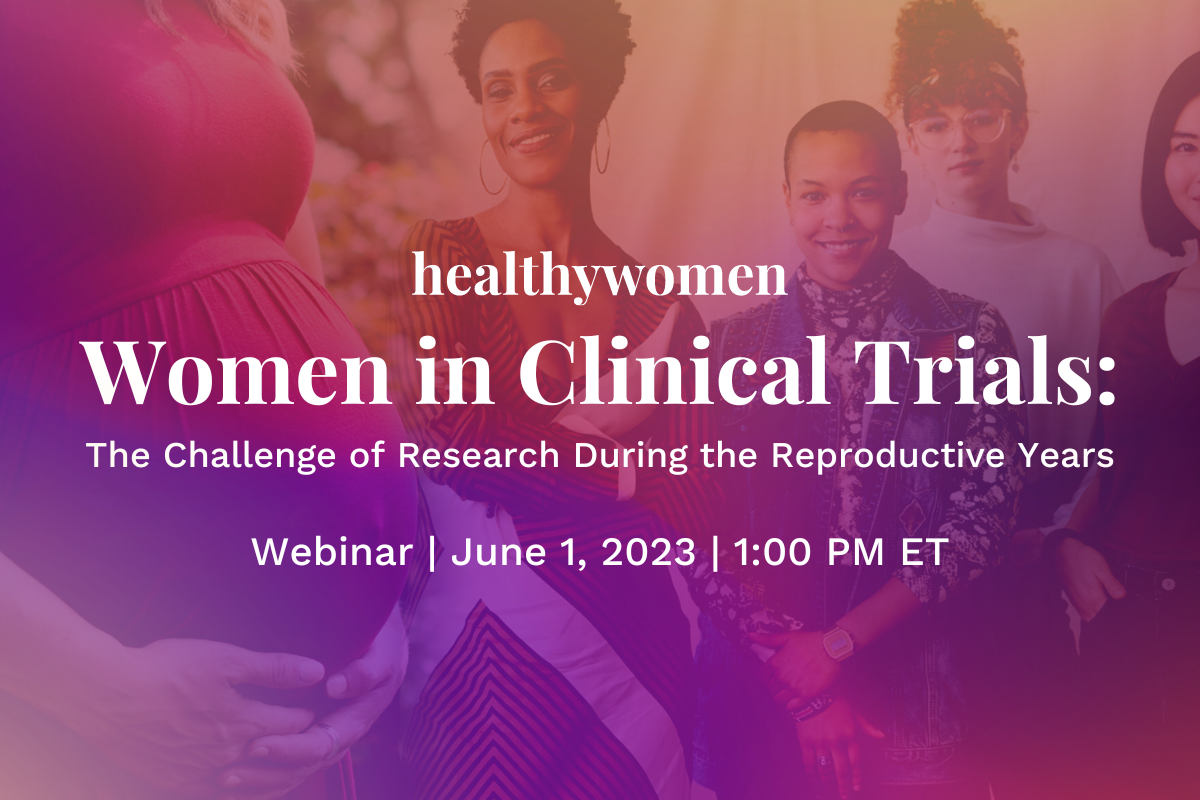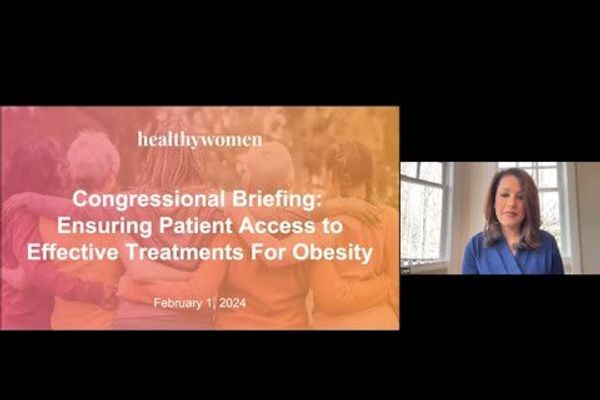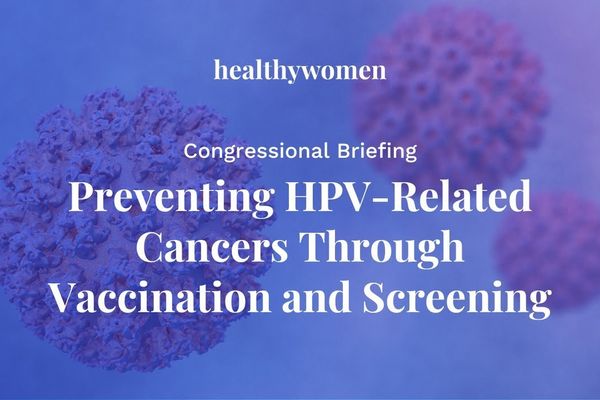HealthyWomen hosted a congressional briefing, “Women in Clinical Trials: The Challenge of Research During the Reproductive Years,” on June 1, 2023.
Clinical trials have long been focused on white men, leaving women woefully underrepresented. Lack of diversity in clinical trials means that healthcare providers (HCPs) often don’t have enough data about how certain conditions affect women or what treatments work — and at what dose — for women.
These knowledge gaps are especially stark for pregnant and lactating women. That’s a problem, according to Beth Battaglino, RN-C, CEO of HealthyWomen.
“Pregnant women get sick and sick women get pregnant,” Battaglino said during a congressional briefing addressing the challenges of including women in reproductive years in clinical trials.
The briefing, Women in Clinical Trials: The Challenge of Research During the Reproductive Years, took place on June 1, 2023, and was moderated by Marsha Henderson, former associate commissioner for women’s health at the Food and Drug Administration (FDA) in the Office of Women’s Health and current member of the HealthyWomen Board of Directors. Panelists included experts representing HCPs, researchers and patient advocates.
Action in Washington, D.C.
The event kicked off with recorded remarks by Rep. Lois Frankel of Florida. Nearly 4 million women give birth in the United States each year, and Frankel noted that each deserves to be safe and healthy during pregnancy and as new mothers.
But pregnant and breastfeeding women are often unsure which medications and medical devices are safe for them to use. That leads many to opt out of breastfeeding or to avoid taking medicines, decisions that can be harmful and even dangerous.
“We can and must do much better for pregnant and lactating women,” Frankel said.
In 2016, Congress established the Task Force on Research Specific to Pregnant Women and Lactating Women (PRGLAC) as part of the 21st Century Cures Act.
In 2018, PRGLAC presented a report to Congress that included 15 recommendations to promote the inclusion of pregnant and lactating women in clinical research. Frankel and a bipartisan group of lawmakers secured funding for an advisory committee to oversee the implementation of the recommendations.
“Our mantra is to protect pregnant people through research instead of from research,” said Diana Bianchi, M.D., director of the Eunice Kennedy Shriver National Institutes of Child Health and Human Development (NICHD) at the National Institutes of Health and chair of PRGLAC.
To illustrate how NICHD funding is being used to implement PRGLAC recommendations, Bianchi described a study showing that several commonly used drugs that lactating women take appear in babies at very low levels. The initial findings suggest that these medications may be safe for breastfeeding women and their babies.
The view from the doctor’s office
Rebecca Abbott, senior director of advocacy for the Society for Maternal-Fetal Medicine, represented the perspective of HCPs who specialize in caring for pregnant women, especially those who are at high risk for pregnancy-related complications.
One in five women of reproductive age in the United States have two or more chronic conditions, which put them at higher risk for pregnancy complications. Other women develop conditions during pregnancy, such as dangerously high blood pressure.
A common thread between these groups is the need for medication, Abbott said. In fact, 9 in 10 women report taking some kind of medicine during pregnancy, and 7 in 10 take at least one prescription medicine. However, she said, little is known about how safe or effective most medications are in pregnant women because pregnant and lactating women are systematically left out of most clinical research in order to protect them and their babies.
Though Abbott said these HCPs are used to practicing medicine with imperfect information, that doesn’t mean it’s the best way to practice. For example, she said that women often stop taking antidepressants during pregnancy or when they’re breastfeeding because of safety questions. But skipping those medications may be dangerous; a CDC analysis showed that mental health conditions are the leading cause of death during and post pregnancy.
“Our failure to gather the necessary safety and efficacy data creates situations where patients and clinicians make decisions based on unknown or perceived harm rather than clear and robust safety data,” Abbott said.
Respecting community voices
“We have the power to change the past,” said Kay Matthews, founder of the Shades of Blue Project, an organization dedicated to helping women of color before, during and after childbirth.
To make positive change, though, Matthews argued for listening to community voices and addressing barriers to engaging in clinical research, especially in communities of color.
Barriers include lack of awareness that clinical trials are available as well as lack of trust resulting from historical trauma that people of color experienced at the hands of the scientific and medical communities.
“If you do not value the fact that there is historical trauma associated with a lot of what is happening, then you’re missing the mark,” Matthews said. “You will never get the results or the better outcomes that you want if you do not listen to the stories of folks with lived experience.”
This investment in improving engagement is essential, Matthews argued. She advocated for engaging patients with compassion, intentionality, clear understanding and respect.
“No matter how you see us — the community, the client or consumer, we are the biggest part of this,” Matthews said. “We must first build trust within our communities of color before we will truly be able to have a lasting impact for change.”
Moving past history
According to Ramita Tanden, chief clinical trials officer at Walgreens, concerns about mistreatment of pregnant women led to research guidelines that designated pregnant women as vulnerable people, requiring special protections. In June 1993, the FDA undid a 1970s policy that banned most women of reproductive age from participating in clinical research. In 2016, the FDA launched the Diverse Women in Clinical Trials Initiative to increase participation in clinical trials among women.
About half of clinical trial participants are now women, but trials still need to include broader representation of women from diverse backgrounds, including race, ethnicity, sexual orientation, age, and disability and health status, Tanden said.
Tanden argued that community pharmacies can be a welcoming entry point to increase research participation among a broader cross-section of people. By making participation more local and more convenient, a wider range of people will have access to education about clinical trials and be empowered to decide whether to participate. If they choose to participate, it will be easier to do so.
Battaglino wrapped up the event with a call for collaborative action. “It is clear that it will take all of us — government, not-for-profits, corporations and the research community — to ensure appropriate representation.”







